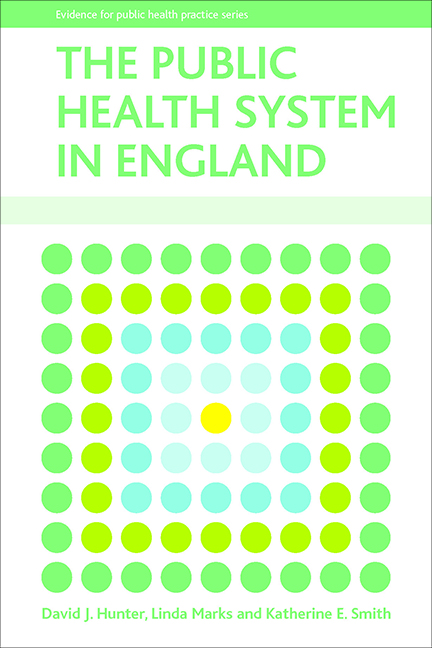Book contents
- Frontmatter
- Contents
- List of boxes and figures
- Acknowledgements
- List of acronyms
- About the authors
- one Introduction
- two Public health and a public health system
- three The evolution of the public health function in England (1): 1974–97
- four The evolution of the public health function in England (2): 1997–2009
- five Current issues in the public health system in England
- six Looking to the future
- Appendix: NHS reorganisation – 1975–2009
- References
- Index
two - Public health and a public health system
Published online by Cambridge University Press: 01 September 2022
- Frontmatter
- Contents
- List of boxes and figures
- Acknowledgements
- List of acronyms
- About the authors
- one Introduction
- two Public health and a public health system
- three The evolution of the public health function in England (1): 1974–97
- four The evolution of the public health function in England (2): 1997–2009
- five Current issues in the public health system in England
- six Looking to the future
- Appendix: NHS reorganisation – 1975–2009
- References
- Index
Summary
As already noted in Chapter One, public health is a contested term, without a single or a simple definition. Its amoeba-like nature means its parameters change in line with perceptions of the key influences on the health and wellbeing of populations, while the components of a ‘public health system’ not only reflect how public health is defined but also inform the myriad of organisational routes through which public health problems are galvanised and addressed.
In 1948, the World Health Organization (WHO) defined health as “a state of complete physical, mental and social well-being and not merely the absence of disease or infirmity”. This influential and aspirational definition appeared in the Preamble to the WHO's Constitution as adopted by the International Conference held in New York between 19 and 22 June 1946. It was signed on 22 July 1946 by the representatives of 61 States (WHO, 1948). The definition indicates the potential range of factors that can have an impact on individual health and wellbeing. By implication, it also indicates the breadth of the public health agenda, reflecting its potentially all-encompassing nature. Population health, including inequalities in health, are influenced by national fiscal and public policies, the distribution of wealth and the broader social and economic environment across the whole of the life course. Many issues with potentially devastating impacts on population health, such as climate change and new pandemics of infectious diseases, require concerted political, cross-national and global action.
Public health activities give rise to political and ethical tensions, which are reflected in debates over the boundaries of ‘stewardship’, defined as the collective responsibility that governments assume for protecting the health of their populations (Saltman and Ferroussier-Davis, 2000). Moral and ethical questions arise over the balance to be negotiated across personal and collective responsibility, across public and private interests, and between the rights of the community vis-à-vis personal freedoms. The question of stewardship also raises issues over the primacy of health and health improvement in policy decisions taken in other sectors, which may have a bearing on health. Stewardship in this context situates public health in a wider political context and may involve trade-offs across different sectors.
At the level of discourse, different connotations of calling an issue a ‘public health problem’ add further complexity.
- Type
- Chapter
- Information
- The Public Health System in England , pp. 17 - 48Publisher: Bristol University PressPrint publication year: 2010

